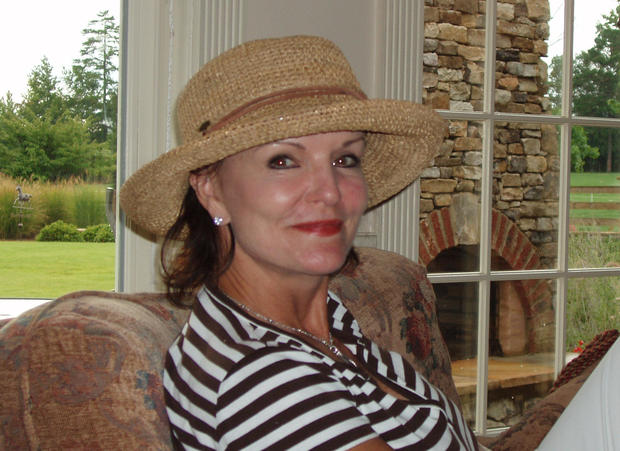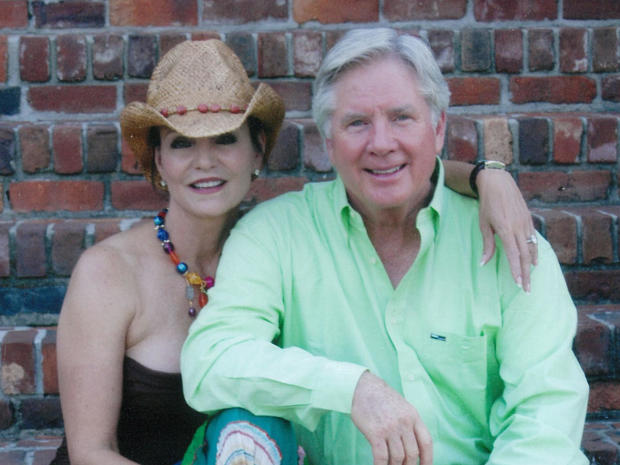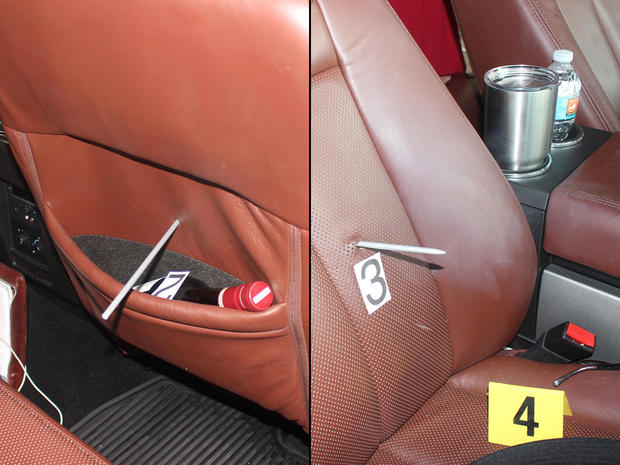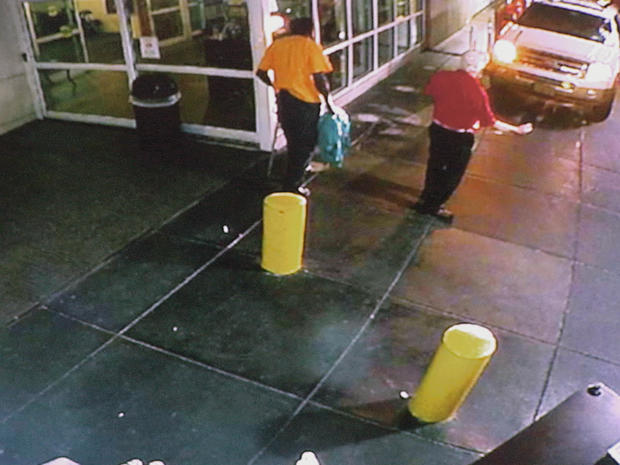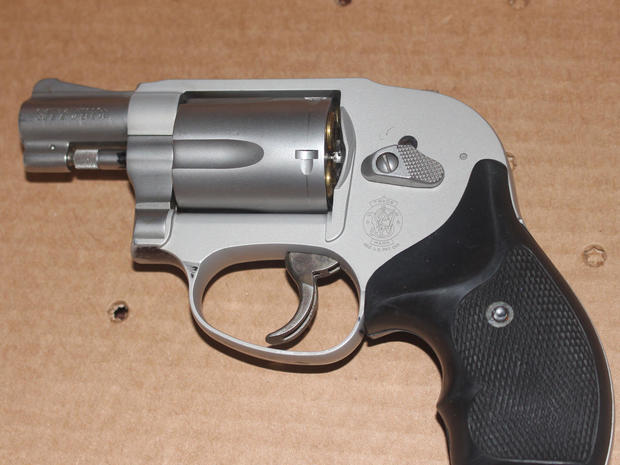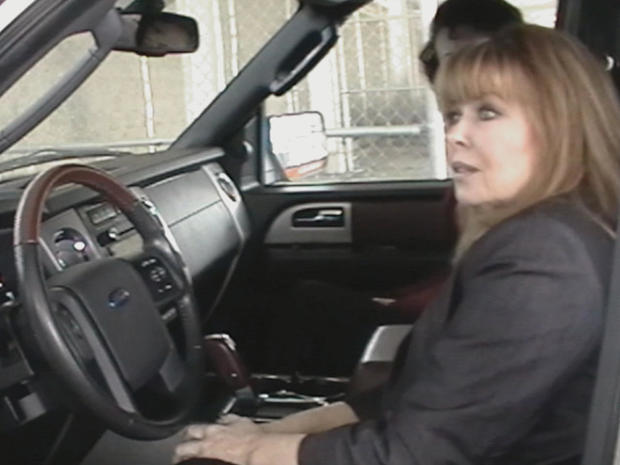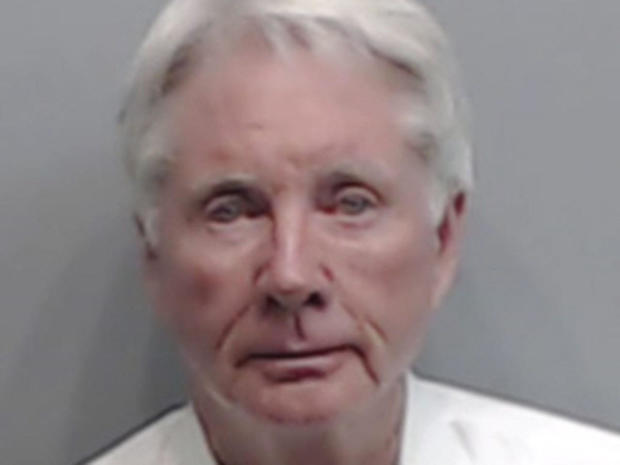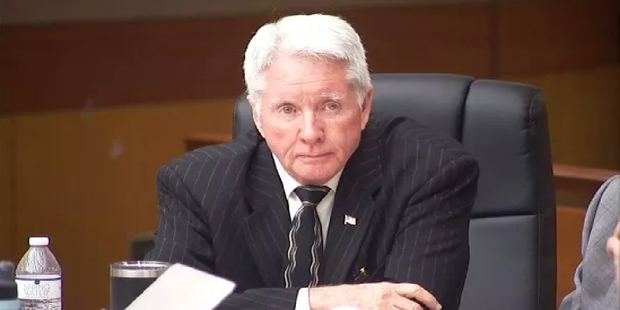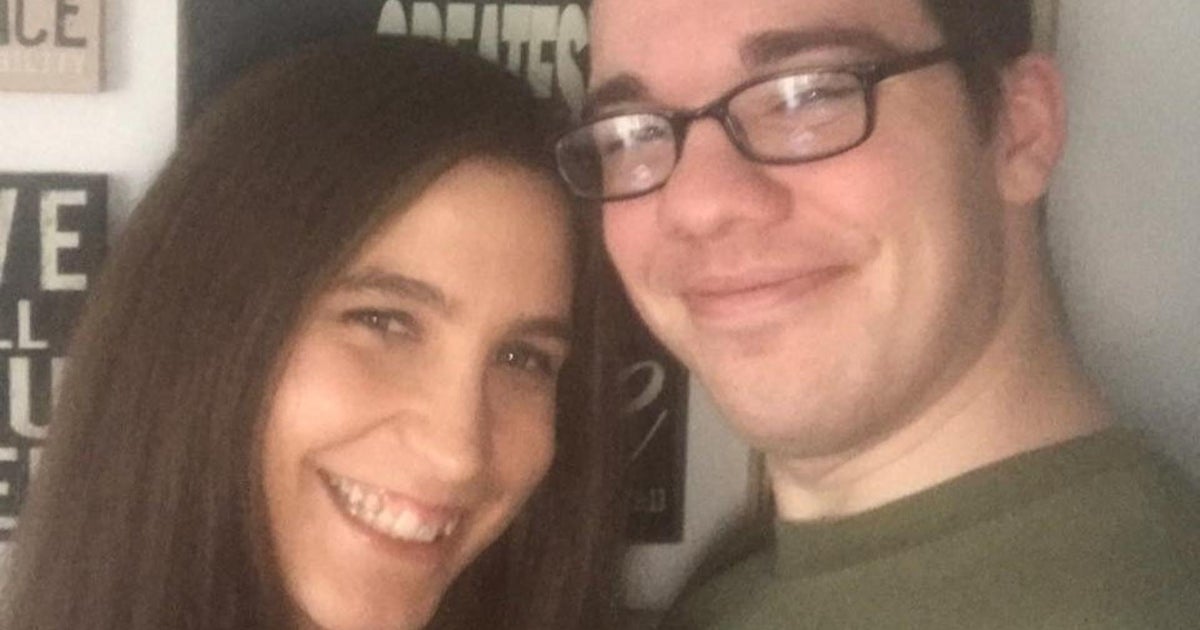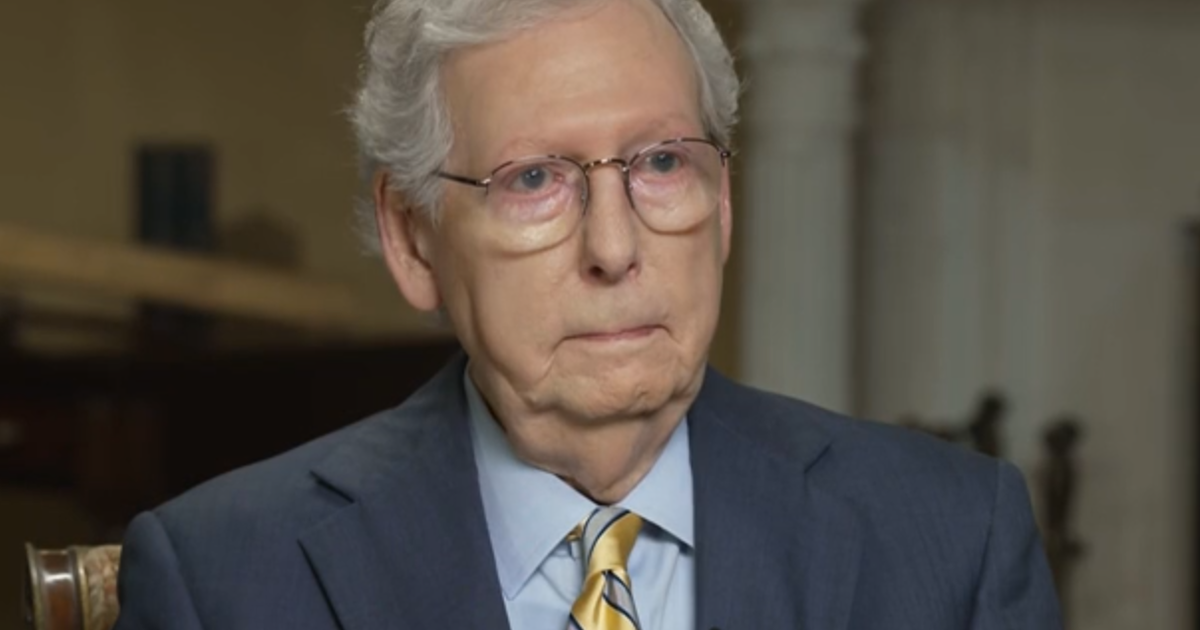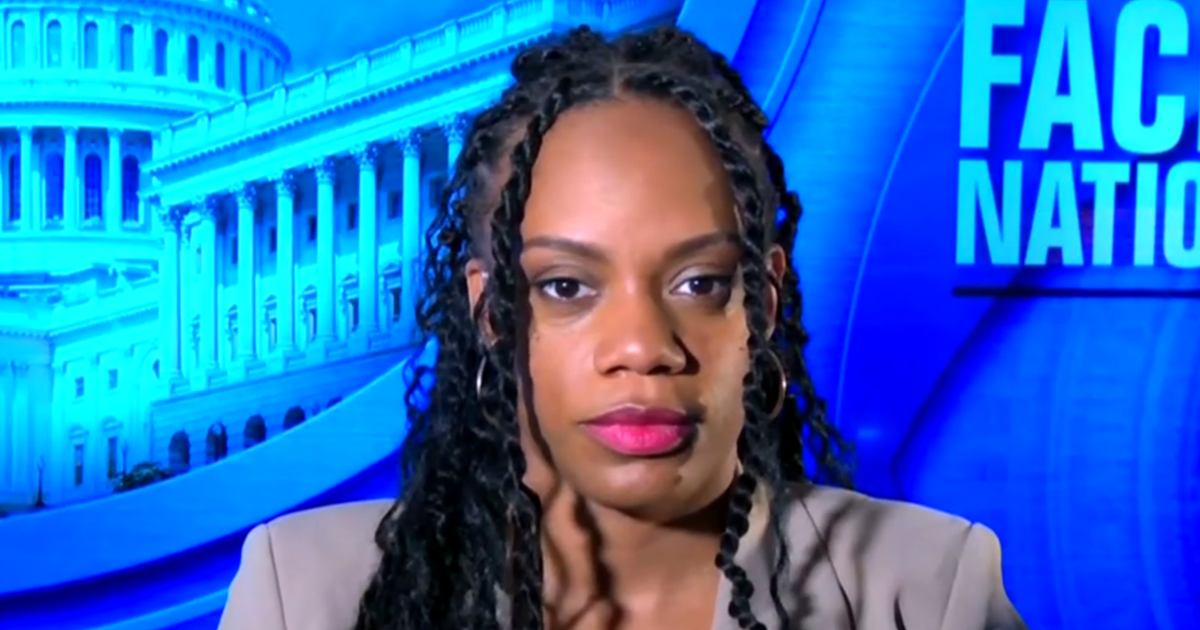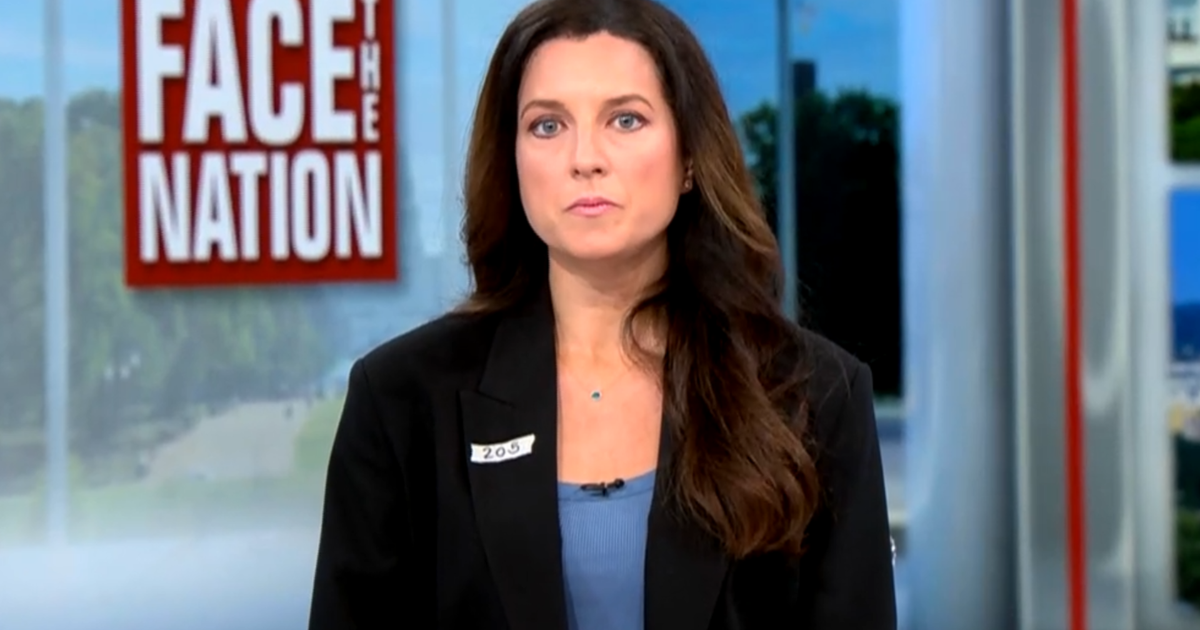Atlanta attorney fatally shoots wife in SUV: Accident or cold-blooded murder?
Editor's Note: Tex McIver won his appeal for a new trial in 2022, the Georgia Supreme Court ruling that jurors should have been able to consider the lesser charge of misdemeanor involuntary manslaughter. On Jan. 26, 2024, he pleaded guilty to involuntary manslaughter in exchange for a prison sentence of eight years. With credit for time served, he could be released by mid-2025. Read more here. Our earlier story is below.
Produced by Judy Rybak and Josh Gaynor
[This story originally aired on April 28. It was updated on Sept. 15.]
"This was an enormously high-profile case," says Bill Rankin, a reporter for the Atlanta Journal-Constitution and a "48 Hours" consultant. "They were a big-time power couple."
On Sept. 25, 2016, Tex and Diane McIver were heading home after a long day of golfing and an evening of drinking. A friend who did not drink was at the wheel of Tex's SUV. Diane was in the front passenger seat and Tex was right behind her. He says he was fast asleep.
Not far from home, they hit traffic and exited the highway. Tex says he woke up afraid that they were in a bad neighborhood. He asked his wife to hand him the .38 caliber handgun he kept in the car's console. Minutes later, with that loaded gun now in his lap, Tex says he fell back asleep. "And it went off," he later told police.
Tex McIver shot his wife of 11 years in the back. She died during surgery.
"Can a .38 Special just accidentally go off?" '48 Hours" correspondent Maureen Maher asked gun expert Bert Davis. "Never known it to happen. You have to pull the trigger," he says of the Smith and Wesson revolver like the one that killed Diane.
Tex's attorney Bruce Harvey knows his biggest challenge is that gun. "Clearly, a trigger was pulled. The question is was that a voluntary, knowing and intentional action or an involuntary action based upon an accident?"
But Tex was no stranger to guns. He had a collection of nearly 40, including rifles and AR15s.
The idea that Tex McIver should have known better, was about to become a central theme in this case … but it's what Tex did after the shooting that, to some, made him seem more and more like a killer.
"It gets really crazy," said Rankin. "I think we've called it a textbook example of what not to do after you kill your wife."
LOVE STORY OR MURDER MYSTERY?
Breakdown podcast: They drove back to Atlanta on a Sunday night ... They were headed to Tex and Diane's luxury condominium in Buckhead.
On the night of Sept. 25, 2016, Tex McIver shot and killed his wife Diane. They'd been together for 16 years; married for 11 years.
Anne Schwall: I remember the first time I ever met Diane. …She just had such a commanding presence about her.
According to close friend Anne Schwall, Diane was the love of Tex's life.
Anne Schwall: She was beautiful, and …There was such -- an energy and electricity about her.
The year was 2000. Diane, 47, was recently divorced with no children, and had a thriving career as the executive vice president of a real estate and advertising company.
In search of a fresh start, she moved into this luxurious condominium in Atlanta's swanky Buckhead neighborhood.
Linda Winkler: Everyone in the building was talking about her.
Maureen Maher: Why? [laughs]
Linda Winkler: She had a way about her.
Linda and Rance Winkler say their new neighbor was hard to miss.
Linda Winkler: She wore St. John and Chanel on the golf course. She wore hats just about every day … And she had a presence and a way of carrying herself.
But, says Linda, no one paid more attention to Diane than another popular divorcé in the building: wealthy labor lawyer Tex McIver.
Maureen Maher: Before he met Diane ... did he have … a love life that you knew of or a dating life?
Linda Winkler: No. He was so consumed with his work. There were a lot of women who were very interested in him having a dating life, but // he'd been through a very-- painful, difficult divorce. It wasn't until Diane came along that he was interested in having a romantic life.
But Diane was less than interested in Tex.
Linda Winkler: Tex did everything he could think of to try and get her attention. …he would call me and he'd say … "I've left notes on the windshield of her car. …I've left notes under her door. I'm not getting anywhere."
Maureen Maher: What was her objection?
Linda Winkler: I think she just -- was very busy … And I think she was coming out of a relationship that had been problematic. …But -- they hit it off.
Tex was a decade older than Diane, but they soon became inseparable -- spending much of their free time at Tex's weekend home, fondly known as "The Ranch," where the couple was known for throwing parties for Atlanta's rich and powerful, says friend and Putnam County Sheriff Howard Sills.
Sheriff Howard Sills: They were big entertainers. They were always havin' somebody there for some kind of party or some kind of political -- thing like that.
Sheriff Howard Sills: Diane was … always the life of the party. And -- she was always the boss of the party too. … Tex was -- usually very reserved -- a consummate gentleman. If a lady walked in the room, he was up like a Jack-in-the box.
After five years together, Diane agreed to become Mrs. Tex McIver.
Linda Winkler: He cared about her. …Which was probably the very first time she had that experience in a lotta years. He didn't need her --
Maureen Maher: That somebody cared about her?
Linda Winkler: For her.
Maureen Maher: Just for her?
Linda Winkler: Just for her, not for her money. He -- had as much as she. In fact-- in terms of liquid assets, he was further along than she.
So, having both suffered through painful and expensive divorces, the couple decided to keep their finances separate.
Linda Winkler: I don't know anyone, actually, who's combined their assets, having married at the age … that they married. And you have to remember that Tex had this terrible, painful --
Maureen Maher: Expensive.
Linda Winkler: -- divorce. And he was never going to put himself in a situation like that.
Maureen Maher: Was there an issue of money between them?
Linda Winkler: Not in … the conventional sense. But when they started building this place, you can see this place. You see what it's like.
Maureen Maher: It's a show place…
Linda Winkler: Yes!
Linda is talking about the guest house on Tex's property. Before the wedding, they say Diane insisted on building the massive party house that she named "The Saloon."
Rance Winkler: Tex really didn't want all this. Diane wanted it.
Linda Winkler: The scale of it.
Rance Winkler: And he told her that if she wanted it, she would pay for it. And she said, "Fine."
But money, and who paid for what in that relationship, would come back to haunt Tex, becoming a possible motive for murder.
Maureen Maher: Is there any scenario where you can think that Tex would have shot Diane intentionally?
Anne Schwall: Never. Never once.
Anne Schwall says she admired Diane and Tex so much that she asked them to be godparents to her youngest son, Austin.
Anne Schwall: …they just adored him, and they just poured so much love into … him.
Tex was all the family Diane had, and after his divorce, he was estranged from two of his children. Too old for children of their own Schwall says they focused all their attention on Austin.
Anne Schwall: They just wanted so much to show him all the great things that he could do and how he could grow up and be such a responsible young man. …teaching him … how to … ride horses, and how to fish, and how to be a good steward of the land and of animals.
Maureen Maher: And how did -- Austin feel about them?
Anne Schwall: Oh, he adored 'em.
The ranch was their special place, and every year it's where Tex and Diane insisted on hosting extravagant birthday parties for Austin.
Anne Schwall: The birthday parties were legendary. A sign of how much they loved him.
Maureen Maher: Tell me when you heard about what happened?
Anne Schwall: So he called me. It was in the middle of the night. [Emotional] … And as soon as I heard his voice and he said, "We lost Diane." And my immediate reaction was, "how am I gonna tell Austin?"
Schwall says Austin never once blamed Tex for Diane's death.
Anne Schwall: He actually was just really worried about, you know … how Tex was doing.
Linda Winkler: He's never said, "I didn't shoot her." He's never said, "I didn't kill my wife." …He is profoundly regretful.
Rance Winkler: He talked to me a c--couple of weeks ago, and he said, "I – I -- it's like, I smell her. …And I break down and I cry."
It was all a tragic accident, according to Tex's defenders. But here's the biggest problem: no one, including Tex, can explain how his gun went off, and killed his wife.
Rance Winkler: Even to this day --
Maureen Maher: He doesn't remember.
Rance Winkler: -- he doesn't know exactly how it went off.
Linda Winkler: We just asked him that day before yesterday.
Rance Winkler: He still cannot give an answer to exactly what happened.
Two days after Diane's death, Tex, and his then-lawyer met with Atlanta Police Department homicide detectives:
DET. DARRIN SMITH: What do you remember after the gun went off?
TEX MCIVER: The fear, the shock.
TEX MCIVER: I immediately called out, I said, "Is everybody alright?" And, Dani Jo said, "Yes." And Diane's head was kind of slanted, and she said, uh, "I've been shot."
As detectives set out to investigate the shooting of Diane McIver, they focused on their best witness:
DET. DARRIN SMITH: You ever taken any, like, safety classes, or anything like that?
TEX MCIVER: No, I was in the military. … I don't worry about a revolver.
And they focused on their best piece of evidence.
THE SHOOTING OF DIANE MCIVER
TEX MCIVER [police interview]: Here we are in an almost new SUV, and two women in the front seat … And I said, "Yeah. I'd like to, if you don't mind, please hand me my gun."
There is no doubt that Tex McIver pulled the trigger on the gun that killed his wife Diane. The question is why?
Bill Rankin: Was he asleep, as he said he was? And he was jolted awake and pulled the trigger? Or … did he wanna kill his wife?
Reporter Bill Rankin's "Breakdown" podcast takes a deep dive into the Shakespearean drama surrounding Tex McIver about the McIver case for the Atlanta Journal-Constitution and is a "48 Hours" consultant on this case. Using a similar car, Rankin showed "48 Hours" how the bullet that killed Diane McIver traveled through the passenger seat of Tex's SUV.
"Breakdown" podcast: Holding a loaded handgun, pointing it at your wife. Falling asleep. Seems pretty reckless.
Maureen Maher: It hits there [pointing to the back of the front passenger seat].
Bill Rankin [sitting in the back right passenger seat]: And it goes from right to left, through the seat.
Maureen Maher: And exits out here -- on the left side.
Bill Rankin: Right. And goes down -- slightly downward path, through his wife's body.
The bullet went through Diane's left rib cage and diaphragm, severed a vein and artery in her spleen, and then hit several organs including her left kidney and stomach.
That night, detectives were anxious to hear Dani Jo Carter, the car's driver, explain what Tex did after he shot his wife:
DANI JO CARTER [police interview]: …she started breathing funny and she, you know, kind of passed out.
DANI JO CARTER [police interview]: All I could think of was Piedmont Hospital and I thought I don't know how to -- I don't know how to get there; and he says, no, Emory's closer…
Bill Rankin: Tex decided to go to Emory University Hospital …
There were four hospitals, all approximately less than 5 miles from where the shooting is believed to have taken place: Emory was the farthest at about 4.3 miles. But one of the best trauma centers in all of Georgia, Grady, was only about 3.2 miles away.
Bill Rankin: Anybody who lives in Atlanta knows about Grady Hospital … it's a level one trauma center.
Bill Rankin: There were people who have said that he went to Emory Hospital because it was gonna take longer and maybe let her bleed out.
Family friend Sheriff Howard Sills, who is not involved in the case, says no way, and explains that Grady just was not on Tex's radar.
Sheriff Howard Sills: …if you're rich and you're affluent then you don't wanna go to Grady Hospital. …because Grady Hospital's where indigent people go. …The people in that car that night, they would have thought Emory.
Dramatic surveillance footage shows the SUV arriving at Emory's emergency room, and Tex helping Diane into a wheelchair.
Then, before surgery, Diane made a critical statement to her doctors: her husband did not mean to shoot her.
TEX MCIVER [police interview]: She said it was an accident.
But two hours later, Diane McIver died on the operating table at 12:49 a.m.
TEX MCIVER [police interview]: If you wanna have the worst feeling in your life, is to be sitting in one of those waiting rooms, two surgeons in scrubs and a chaplain come around the corner, and start walking toward you.
Now it was up to detectives to determine, was it truly an accident or was it coldblooded murder.
The Smith and Wesson .38 caliber revolver that killed Diane was in the car's center console, inside a plastic bag, when it was handed to Tex by Diane.
TEX MCIVER [police interview]: We've had some break-ins at our office … in response to that, I had wrapped my gun in a Publix grocery sack.
Rance Winkler: The gun was still in the bag when it went off.
Maureen Maher: The gun was still in the bag?
Rance Winkler: Yeah.
Maureen Maher: The gun was?
Rance Winkler: …he mighta had his finger on the trigger.
Law enforcement analyst and former cop Vincent Hill says a guy like Tex should have known better.
Vincent Hill: The first rule of firing a gun is, don't put your finger on the trigger until you're ready to pull and you have your target in sight.
Vincent Hill: Any shooter keeps their finger on the trigger guard until they're ready to pull the trigger. …So to wake up out of this sleep, you're startled, your finger's automatically on the trigger, you pull this trigger … And you do one shot, a kill shot. In my mind, it's not likely.
And Hill is not alone in his opinion.
That's why "48 Hours" asked former Georgia Bureau of Investigation Agent Bert Davis to take us out to a gun range not far from Tex's ranch to understand the gun.
Bert Davis: You know the revolver can be fired two ways.
The handgun, which only shoots one bullet at a time, can be fired in two very different ways, "single action" or "double action." Either way, it does not look good for Tex. Because experts say this gun only goes off if the trigger is pulled.
In single action, the shooter pulls back the hammer. With the gun already cocked in position, it hardly takes any effort to pull the trigger to fire it.
It only takes about two pounds of pressure to pull the trigger, which is why experienced gun owners say you only cock this gun if you know you are about to use it.
Bert Davis: No one that I know of would -- would sit there -- with a gun in single action.
A double-action is a different story. In double-action, you pull the trigger and the gun automatically pulls the hammer back, rotates the cylinder and fires. But it's not easy, because it takes about 12 pounds of pressure to actually pull the trigger, making it much harder to fire it accidentally.
Bert Davis: It would be difficult.
Maureen Maher: But not impossible.
Bert Davis: But not impossible.
But somehow, that gun was fired and, to this day, Tex can not answer this question:
Maureen Maher: Was the gun in single-action or double-action?
Bruce Harvey: Good question.
Maureen Maher: Do you have an answer?
Bruce Harvey: Do I have an answer? Why do I have to answer these? Why does Tex McIver have to answer anything?
Tex's lawyer, Bruce Harvey, is one of Atlanta's most successful and sought-after defense attorneys.
Maureen Maher: What is your challenge with this gun?
Bruce Harvey: Well, I think you just put your finger on it, no pun intended. …clearly, a trigger was pulled, right? … The question is … was that a voluntary, knowing and intentional action or an involuntary action based upon an accident?
But Tex was clearly no stranger to guns. Out at the ranch, he had what many would consider an arsenal of weapons. After Diane's death, Tex asked his buddy Sheriff Sills to go out to his ranch and collect his guns for safekeeping.
Maureen Maher: You cleared out how many guns?
Sheriff Howard Sills: As I recall it was about 35 guns.
Including rifles, handguns, and AR-15s.
Maureen Maher: Would you describe him … as a gun guy?
Sheriff Howard Sills: Yes and no. …Here in the South -- everybody's got a lotta guns.
But the idea that Tex McIver should have known better was about to become a central and recurring theme for the 75-year-old lawyer.
Maureen Maher: it gets really crazy.
Bill Rankin: I think we've called it a textbook example of what not to do after you kill your wife.
HIS OWN WORST ENEMY?
"Breakdown" podcast: Bruce Harvey is one of the most distinctive members of the Atlanta defense bar. He's worn a braided pony tail down his back for decades.
Bruce Harvey was not Tex McIver's first attorney.
Maureen Maher: How did you first hear about it?
Bruce Harvey: It was all over the media.
Maureen Maher: Were you surprised?
Bruce Harvey: Greatly surprised.
Maureen Maher: Yeah.
Bruce Harvey: I'm surprised to this day.
Harvey, who knew Tex through mutual friends, says he watched the news coverage for almost a year, while McIver made a mess of the case and his reputation.
Bruce Harvey: A complete ongoing disaster. Mismanaged from day one. …I think, resulting in the reason that we're sitting here to start with.
It started right after the shooting -- Atlanta's media immediately began clamoring for an answer to why on earth Tex had been sitting right behind his wife in his SUV, with his finger on the trigger of a loaded gun.
Four days after the shooting, Tex had an explanation in a statement made through a spokesman.
Bill Rankin | Atlanta Journal-Constitution reporter: He said that … Tex told him that he asked for the gun because they were either homeless people, carjackers or Black Lives Matter protesters.
That gave Tex an air of being rich, white and oblivious -- igniting a real-life "Bonfire of the Vanities."
Bill Rankin: Why would you equate Black Lives Matter protestors with carjackers? …Why would you inject race into this? …That put the story into a whole 'nother realm. And it went national because of that.
Vincent Hill: …you have this very rich, very powerful white guy, and a city that's predominantly black. …I think that's why this case is so appealing to the public.
As a resident of Atlanta and former patrol officer, Vincent Hill believes that race has played a roll in this case, but only in the court of public opinion.
Vincent Hill: It reminds me of 1994 and O.J. Simpson. Everything was black and white. And we're back in that environment now.
Vincent Hill: You have one demographic that wants to see him go down, and you have one demographic that doesn't wanna see anything happen to Tex.
Tex's attorney at the time publicly denied that his client ever said he was afraid of black protesters. But the damage was done and things were about to get even worse.
NEWS REPORT: CBS 46 has an exclusive look tonight, at the diamonds, the furs and the designer bags about to go on auction.
Bill Rankin: This was pretty stunning.
Just two months after shooting his wife, Tex started selling off Diane's extensive collection of valuable belongings. Her most expensive jewelry, fur coats, and handbags would go to the highest bidders at an auction.
Maureen Maher: I understand it was advertised as her stuff, to bring in more … buyers.
Bill Rankin: And it wasn't just one auction. …It looked like a Nordstrom department store, if not better.
The District Attorney's Office filed motions to block the sales, but a judge denied their requests. And as the executor of Diane's estate, Tex said he had no choice.
Maureen Maher: Why?
Bill Rankin: According to Tex, he said that in her will Diane had left a lot of money to some of her employees and some of her friends. So he needed that money to pay them
Bruce Harvey: Now all that money went into the estate and not to him.
But timing in this case, was everything.
CBS 46 REPORT: Tex has come under fire for holding the two sales while still at the center of the homicide case.
Bruce Harvey: Should it have gone forward at that time? Could it have waited? The answer clearly is yes. And it's somethin' we just have to deal with.
At least Tex still had Dani Jo Carter.
DANI JO CARTER [police interview]: It was a horrible accident.
DET. DARRIN SMITH: And that's it.
Carter was his best witness -- the only other person in the car when the gun went off. The night of the shooting, she told detectives, in no uncertain terms, she believed Diane's death was an accident:
DANI JO CARTER [police interview]: There is not a doubt in my mind that it was completely one of the most horrible accidents.
But on Feb. 2, 2017, a little over four months after the shooting, Dani Jo Carter changed her story:
DANI JO CARTER [Feb. police interview]: He's not been nice to me, and tried to manipulate me.
In a second interview with investigators, conducted inside of Tex's SUV, Carter alleged that on the night of the shooting, Tex told her to lie:
DANI JO CARTER [Feb. police interview]: …he tried to get me to lie, supposedly to protect me from gettin' all wrapped up in this.
Bill Rankin: Dani Jo … said Tex walked up to her and said, "Why don't you just tell police you weren't in the car?"
Bruce Harvey: There's no question she was in the car. There's no question she was driving it. …there's videotape … at Emory Hospital.
Bruce Harvey concedes that it is possible Tex was just trying to protect his friend.
Bruce Harvey: Dani Jo at that particular time was being hounded by the media. …And I think a lot of this effort was to try to -- allow her to avoid the media crunch -- not designed for her not to talk to the police or not to give a particular statement …
Maureen Maher: But there was no media yet at the hospital.
Bruce Harvey: Well, there -- there was going to be.
Maureen Maher: Are you saying that … Tex may have told her to tell the cops she wasn't in the car so that people would stop hounding her?
Bruce Harvey: Yes.
Maureen Maher: So, Tex may have told her that.
Bruce Harvey: If he did.
But there is no denying this: days after the shooting, Tex orchestrated a meeting with his lawyers and two reporters, where Carter was to make a legal and public statement that the shooting was an accident. When she was a no-show and stopped taking his calls, Tex left this frantic voicemail for her husband:
TEX MCIVER [voicemail]: "Let me just be plain. Dani's about to send me to prison. Please erase this voicemail message but call me right away. Y'all have no idea the problem this is causing. It's innocent, but it's absolutely nuclear for me."
Maureen Maher: What does that mean?
Bruce Harvey: What does it mean? I think--it's almost self-explanatory.
Maureen Maher: But it doesn't sound good when he says, "Please erase this voicemail message but call me right away."
Maureen Maher: So what --
Bruce Harvey: And wh -- when—
Maureen Maher: --what does he mean by that?
Bruce Harvey: -- we examine—w -- well, we don't have to explain what he -- he means. They have to explain why it is a crime for him to do that or how it relates.
Bruce Harvey was still watching from the sidelines when, on Dec. 20, 2016, Tex got some good news. The Atlanta Police Department concluded the shooting was not an intentional act. Based on their findings, the Fulton County district attorney charged Tex with involuntary manslaughter and reckless conduct.
CBS 46 REPORT: After spending his birthday behind bars, Tex McIver bonds out of jail, just before Christmas weekend.
But with the case now in the hands of the District Attorney's Office, they decided to launch their own investigation into the shooting.
Bill Rankin: There was a bond hearing where the lead prosecutor, Clint Rucker, strongly hinted that they didn't believe it was accidental. …That made everyone think, "Whoa, OK. This is gettin' even more serious now."
TROUBLE FOR TEX
A little over a week after Tex McIver was charged with involuntary manslaughter, there was more breaking news in this case.
CBS News' Atlanta affiliate, CBS 46, uncovered evidence that at the time of Diane's death, Tex owed his wife $350,000.
CBS 46 REPORT: He was supposed to pay her back with interest, by December of 2014. That never happened.
Tex said that the money was Diane's contribution to the construction of that saloon on his ranch, and that for tax purposes she wanted it to look like a loan.
Rance Winkler: …there was $350,000 … but it wasn't ever actually gonna be paid back by him.
Linda Winkler: The $350,000 was a function of nothing more than taxes.
But on paper, it does look like a loan -- and one that Tex was expected to pay back.
Bill Rankin: That could be argued that he didn't wanna have to pay that off.
Meanwhile, The Fulton County D.A.'s Office was looking for a possible motive for murder when they heard that Diane may have had a second will. Subpoenas were obtained to search the couple's financial records, and that's when then this happened: during a search of their condo, Tex was found to be violating the terms of his bond, with, of all things, possession of a gun.
Bill Rankin: …they found a gun in his sock drawer that he probably went to all the time when he was getting dressed. And … they found ammunition in the drawer right above it.
Tex insisted that the condo had already been searched for and cleared of any weapons, so the Glock pistol, which he claimed had once belonged to Diane, must have been planted. But the judge didn't buy it:
Fulton County Chief Judge Robert McBurney: Mr. McIver possessed the gun. I am going to revoke Mr. McIver's bond.
After four months out on bond, Tex was back behind bars when the very next day there was yet another stunning announcement by the D.A.'s office.
A grand jury that had been hearing testimony for weeks concluded there was enough evidence to charge Tex McIver with the murder of his wife.
Bill Rankin: It was surprising … that it leapt so far from an accident to cold, cruel, intentional killing.
Tex would spend then next eight months in jail, seeing loved ones only through video screen visitations and desperately trying to get out on bond again.
TEX MCIVER [video visit with Austin and Anne Schwall]: Well, I love y'all and I hope to see you Wednesday, if things work out. I love you Austin.
Then, Bruce Harvey took over the case.
Bruce Harvey: I don't believe, I don't believe in my heart of hearts, I don't believe as we are sitting here -- that Tex McIver had any deliberate intent to do any harm to his wife.
Harvey got Tex released and put on house arrest. Then, he set about preparing for trial on a case where there had been one public blunder after another.
Maureen Maher: Are you concerned about being able to seat an impartial jury?
Bruce Harvey: Yes. I am. …I think … Tex has been -- unfairly vilified in the court of public opinion.
Jury selection in the trial of Tex McIver began on March 5, 2018, and took a whole week.
When the trial began, Chief Senior Assistant District Attorney Seleta Griffin delivered the State's opening argument:
Prosecutor Seleta Griffin: …the day the defendant shot his wife in the back, his life was spinning out of control.
And what became fairly clear is that the prosecution believes Tex McIver's motive for murder was money.
Prosecutor Seleta Griffin: The easiest way for him to gain control was to kill Diane.
Maureen Maher: Is money a motive here?
Bruce Harvey: No. Very simple answer. …He … is … much worse off without her. …I think that is a huge red herring. You know why? Because they've got nothing else.
Prosecutor Seleta Griffin: This is a case about maintaining an image of wealth and power that the defendant created for himself. And the lengths that he went through to keep it.
THE TRIAL OF TEX MCIVER
"Breakdown" podcast: What if Tex didn't mean to do it. Or what if Tex did mean to do it but the prosecution fails to prove it.
Testimony in the murder trial of Tex McIver began on March 13, 2018, and lasted 20 days. By closing arguments, the jury had heard two very different theories of why he shot his wife.
Prosecutor Clint Rucker: I'm gonna talk to you about the facts.
Prosecutor Clint Rucker and his team painted an ugly picture of a man who they say was broke and so desperate for money that he murdered his wife.
Prosecutor Clint Rucker: He was takin' her money and he was regaining control…
Evidence showed that Tex's salary at his law firm had been cut by more than half, while the state says he was living way beyond his means. And remember, the McIver's kept their finances separate.
Prosecutor Clint Rucker : Remember this email? … This is a couple months before the murder. This is what the defendant says to his wife: "I am seriously tryin' to reduce my monthly expenses." Why? 'Cause his monthly expenses at the ranch alone were $20,000 to $25,000 a month. … What does he say? "I plan on hittin' the lotto sometime this week."
Diane joked that Tex might want to think about becoming their new ranch hand.
Prosecutor Clint Rucker: "Read his job description because that is your next life chapter." …This is what he said in response. "Oh, well, back to gigoloing."
The state believes that Tex was using Diane for her money, but what drove him to murder is this: before they were married, Tex borrowed $750,000 from Diane. As payment, the prosecutors say he deeded her half of his ranch.
Prosecutor Clint Rucker: What that meant was that now, the property was no longer owned solely by the defendant.
In 2011, Diane loaned Tex another $350,000, but this time she made Tex sign a promissory note that gave her the right to foreclose on the ranch if he didn't pay up.
Prosecutor Clint Rucker: So when the loan didn't get paid … She said … "I'm ah put another clause in here that says, you know what, it's not that I don't have to wait until you can't pay me, I can foreclose at any time." …And as we sit here today, the loan is in default.
ADA Cara Convery: By killin' Diane, the defendant will regain sole ownership of the ranch.
The jury heard Dani Jo's Carter's claim that Tex asked her to lie. They also heard about the Black Lives Matter statement and the auctions. But there was more -- what Tex did with Diane's ashes after she was cremated.
Prosecutor Clint Rucker: Took him 42 days to pick up his wife's remains. Look, and that's where I found 'em. …tucked back in a closet. ….It's just not right.
But the defense team told a very different story -- a love story.
Don Samuels | Defense attorney: They were in love. …Nobody ever saw arguing. Nobody ever heard her say, "I wanna foreclose if you don't pay me my -- pay me my money."
Bruce Harvey and the defense team tried to show that Tex didn't need Diane's money.
Bruce Harvey | Lead defense attorney: Tex was not broke nor was he in dire financial straits. The state's calculation -- the state's calculation puts Tex's net worth at $1.7 million before Diane dies.
But what the defense tried hardest to hammer home was that the shooting was nothing but an accident. And remember, that's what Diane said before she died.
Bruce Harvey: The three people that were in the vehicle all said, "It was an accident."
And as for the gun:
Bruce Harvey: All the experts will agree that … nobody can tell whether the firearm was in single-action … and … Everybody said to you, "I can't tell you whether it was intentional or unintentional."
Bruce Harvey: Remember the expert?
Harvey used the state's own gun expert to show that anyone can fire the gun accidentally.
Bruce Harvey: Remember he was demonstrating -- the weapon and pulling the trigger, when he testified right here.
Zachary Weitzel | Georgia Bureau of Investigation: Because you notice the trigger [trigger clicks] …. Oops.
Bruce Harvey: "Oops." He's demonstrating it for you on the witness stand. He accidentally pulls the trigger. He says, "Oops."
The shooting could not have been premeditated says the defense, because it was Diane who told Carter to take that exit when they hit traffic. And after Tex was handed his gun, he fell back asleep.
The defense also presented an expert who said Tex suffered from a long documented sleep disorder, which might explain why he unintentionally pulled the trigger, and can't remember how.
Dr. David Rye | Sleep expert: Oftentimes, when people arouse from these, they don't arouse quickly … and they frequently have amnesia for this.
As the case was about to go to the jury, the defense suggested that the state had not proven its case beyond a reasonable doubt.
Bruce Harvey: We do not convict people … in fogs of speculation but on the bedrock of fact.
And on behalf of the state, Clint Rucker pleaded with the jury to punish Diane McIver's killer.
Prosecutor Clint Rucker: Diane tried to stand up for herself … Who will stand for Diane McIver? A great woman, she tried to be. …Will you stand … for Diane McIver? As she cries out, "Who will stand for me?"
The jury deliberated for about 29 hours. At one point, each sat in the back passenger seat of McIver's SUV, holding the gun that killed Diane.
Bill Rankin: Some of the jurors were actually clicking the trigger. …So I think it could've made a huge difference in the outcome of this trial
On their fourth full day of deliberations, the jury sent a note to the judge saying they were deadlocked.
Fulton County Chief Judge Robert McBurney [reading note from jury]: "We don't see a path to overcome our differences…"
But the judge told them to try again. Then, just two hours later, they reached a verdict.
Was it malice murder? Meaning Tex intended to kill Diane; Felony murder? Meaning Tex shot Diane with the intention of causing her bodily harm, but had not intended to kill her; Felony involuntary manslaughter? Meaning he acted recklessly -- or not guilty?
Verdict: On the count of malice murder, we find the defendant not guilty.
Bill Rankin | Atlanta Journal-Constitution reporter: When they said, "Not guilty on malice murder," I was like, "Oh, my goodness."
But then, they said this: "We find the defendant guilty of felony murder…"
Guilty of felony murder -- Tex was clearly stunned. The jury felt that he shot Diane without malice aforethought, but intending to do bodily harm.
Bill Rankin: It might have been a compromise for the jury. It's no compromise for Tex McIver, because -- malice murder and felony murder both carry a life sentence.
A mandatory life sentence.
Bruce Harvey: …it's -- it's a complete tragedy. I mean, that closes the circle. Everybody loses.
Tex McIver handed over his belt and was handcuffed.
Fulton County D.A. Paul Howard: We would like to say to Diane we hope that you are watching and we hope that you felt that we stood for you, and we stood for the things that you represented.
Tex McIver: Given these shackles if you don't mind I would like to sit.
At his sentencing hearing, Tex spoke directly to Diane.
Tex McIver: I know she's here. I feel her presence in speaking these words … 'darling you have brought me more joy and fulfillment than few men on this earth have ever known.
But it's what he didn't*say that stood out.
Judge McBurney: I didn't ever hear you say you're sorry for what you did. To me that silence speaks volumes.
Prosecutors say this is justice for Diane. Tex McIver's supporters disagree.
Anne Schwall: She didn't need justice when it's a terrible accident. … she's in heaven right now, just heartbroken.
